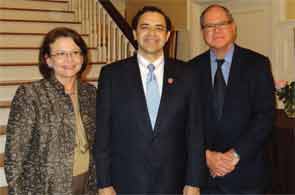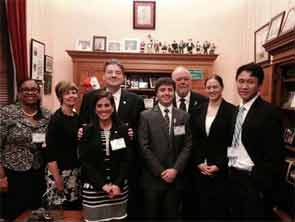

Former Speaker of the U.S. House of Representatives Tip O’Neil famously noted, “All politics is local.” This is a truism, and as such it also applies to our collective advocacy efforts for Advancing Rheumatology!
I am proud of how far the ACR and ARHP members have taken our advocacy for the rheumatology community over the past many years. Led by our able Committee on Government Affairs, our talented and dedicated volunteers and staff, and our professional lobby group, we have achieved a great deal. The recognition of rheumatology in Washington, D.C., has grown and our strategic relationships have been increasingly fruitful. Federal lawmakers and staff recognize the bent forks on our lapels (the powerful symbol of the Simple Tasks campaign) and are gaining a true understanding of the value rheumatologists bring to their patients. Moreover, they are learning how we can make our patients’ lives better and healthier. We have made significant progress in our efforts to increase patient access to rheumatologists and the care we provide, and to the innovative treatments that can make such a difference in the quality of life for the millions who endure rheumatic disease. I will highlight these topics in my next column.
In this column, I want to focus on a recently launched branch of our advocacy program that complements our national efforts. We must make a difference for rheumatology at both the state and local levels. We understand how state laws and regulations can have a major impact on our practices and access to care. In January, our Government Affairs team was expanded to increase our ability to impact critical issues that are being decided in state legislatures across the county. Our state advocacy efforts work hand in hand with state and local rheumatology organizations across the country.
We have targeted standard prior authorization processes, specialty tiers that inappropriately place important medications out of the reach of our patients, step therapies that are not evidence based and the safe and appropriate use of biosimilars in our initial state advocacy initiatives. Dozens of bills related to these issues were filed all across the county. The ACR sent letters of support for legislation in multiple states and co-signed several collaborative letters of support. There were also state-specific legislative initiatives, such as the successful passing of the compounding bill in Maryland (SB 1108), affecting in-office treatments.
Although many proposed bills did not pass, the ACR built relationships with a significant number of stakeholders and raised the visibility of the rheumatology community and the needs of our members and their patients. I am especially pleased to note passage of laws that are rheumatology friendly, including specialty tier bills in Louisiana and Maryland, step-therapy bills in Connecticut and Maryland, and biosimilars bills in Indiana and Delaware.

This new outreach has many components. The Affiliate Society Council (ASC) is growing and now includes 30 members representing local and state rheumatology societies from all over the country. It serves as a valuable resource by providing tangible information and advocacy bridges between local rheumatologists and the ACR. It has been a powerful voice for local rheumatology organizations and will serve as a catalyst to develop more of these important grassroots organizations.
This initiative also includes increased two-way communication about regional issues and focuses on heightened collaboration and engagement among our members and stakeholders. Our staff has attended and supported state society meetings this year in Ohio, Texas, North Carolina, South Carolina, Georgia and New York. They are scheduled to participate in other meetings in the coming months. During these meetings, members received legislative updates and state-specific advocacy information.
This year, I was proud to join the Ohio Association of Rheumatology for the successful launch of its first Legislative Advocacy Day, co-sponsored by the Arthritis Foundation, Great Lakes Region. I was invited to highlight issues involving specialty tiers and the importance of local advocacy. Participants also heard from legislative leadership during the program and met with elected officials. I was proud to see my state rheumatology association take on important local issues and work effectively with our natural partners in advocacy at the Arthritis Foundation.

Relationships Are the Key
Our advocacy initiatives have come far, and we have accomplished a good deal, but there is more we must do. How many of us have a personal relationship with our lawmakers, either our members of Congress or elected officials in our state capitals? These personal relationships are powerful in complementing our lobbying in Washington, D.C., our fly-ins and other meetings on Capitol Hill, and our outreach to state legislators when important bills are being developed.
I have to tell you—and please forgive my redundancy: There is nothing more powerful that can have greater impact for rheumatology than rheumatologists and rheumatology professionals (you and I) who have personal relationships with their lawmakers. By relationship, I mean that they remember and recognize you, and you have opportunities to educate them about issues facing the rheumatology community.
They not only see you in Washington, D.C., during the Advocates for Arthritis conference, but they see you at their local district office from time to time. They might see you at town hall meetings occasionally and at local fundraising events, sometimes on behalf of RheumPAC. Ideally, when your relationship is fully developed, when facing a decision about a healthcare issue or whether to support a particular bill, they will think, “What does my rheumatologist friend think of this?” When you position yourself as a local resource on healthcare issues, they will call you for advice.
It Starts with You
How can we begin to develop a personal relationship with our lawmakers? You have a perfect opportunity to meet with your congressional representative this month, when lawmakers are at home for the August recess. It is easy to schedule a meeting in their district office—and very effective because many fewer constituents do this than you would think.
Another possibility could be to invite your lawmakers to visit your practice. This is a remarkably effective way to demonstrate the important care you provide. It’s also an opportunity to show them how the decisions they make in Washington or in your state’s capital affect you and your patients.
Another opportunity for you would be attending a local fundraising event for your lawmaker’s campaign. Members of Congress are constantly campaigning, and your presence at a local fundraiser is a great way to show your support and get a few minutes of face time. RheumPAC would like to help you build relationships with key members of Congress and can help with support for attending a local event. Just ask our advocacy staff how to get involved, or submit your recommendation for support at [email protected].
The picture above is from Ohio’s Advocacy Day. I went beyond my scheduled visits that rainy morning and joined this group meeting with the Senate Majority Floor Leader. Although he expressed concerns about some of our priority issues, our dialogue led to the delightful realization that we shared common childhood pathways and contacts (including our mutually beloved St. Ignatius High School in Cleveland). We ended the conversation with his valuable insight on proactive efforts we should consider moving forward. I know our efforts that day and the relationships we established will be of great assistance as we continue to Advance Rheumatology!
Please join me and our colleagues in seeking out opportunities to be involved locally with your advocacy. It will make a difference for rheumatology and for our patients. Feel free to seek assistance from our staff team, and send word of your advocacy to Starla Tanner on our government affairs team at [email protected].
Dr. Joseph Flood is a rheumatologist at the Columbus Arthritis Center and adjunct professor of internal medicine in the Division of Rheumatology at The Ohio State University College of Medicine and Public Health, both in Columbus. Contact him at [email protected].

